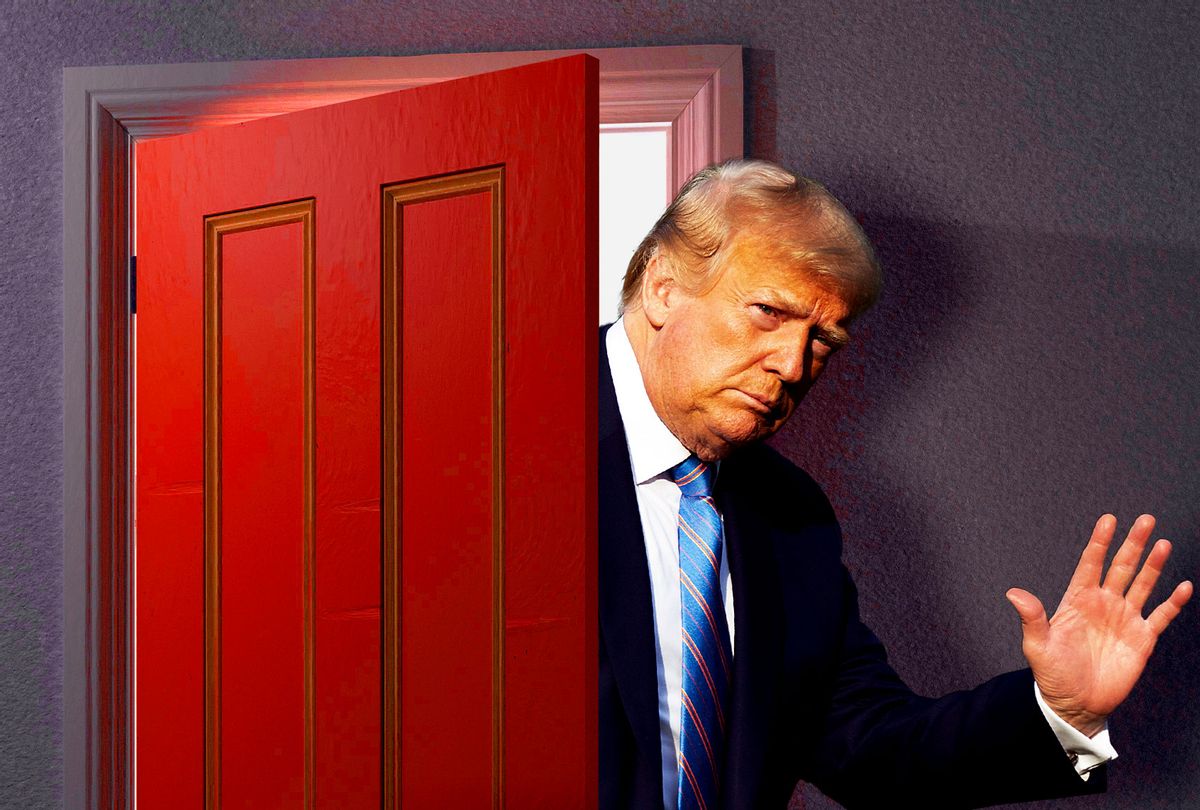Attorneys for longtime magazine columnist E. Jean Carroll, who has accused former President Donald Trump of raping her more than 20 years ago, argued on Friday that it was "wrong and dangerous" for the Justice Department to defend him against her defamation lawsuit.
Carroll filed the lawsuit in 2019 after Trump denied her claim that he raped her in a department store fitting room in the mid-1990s. The Justice Department intervened last year to defend the then-president, arguing that Trump, who accused Carroll of "totally lying," made the comment in his official capacity as the nation's chief executive. A federal district judge last year rejected the DOJ's attempt to intervene but the department appealed the ruling before Trump left office, potentially leaving taxpayers on the hook for his defense.
Carroll's lawyers said in a court filing on Friday that the DOJ is trying to convince the court to "adopt a new rule that would create categorical immunity for any federal official who defames anyone while speaking to the press or responding to perceived critics."
"This rule is both wrong and dangerous," the filing said, adding that it "reflects a disturbing belief that federal officials should have free rein to destroy the reputations and livelihoods of any perceived critic — no matter how unrelated to the business of governance."
Carroll's attorneys asked the 2nd Circuit Court of Appeals court to rule that "Trump did not act within the scope of his employment as President of the United States when he repeatedly, willfully defamed a private citizen to punish and retaliate against her after she revealed that he had sexually assaulted her decades before he took office."
The DOJ in its appeal argued that Trump discussed a matter of public concern in denying the allegation, which lawyers said was "an issue potentially relevant to his ability to perform the duties of his office effectively."
"The President … acts within the scope of his office when he responds to public critics," the DOJ said in a court filing.
Carroll first alleged that Trump raped her during an encounter at a Bergdorf Goodman in her 2019 book "What Do We Need Men For?" Trump responded by accusing Carroll, best known as a columnist for Elle Magazine, of lying and told reporters, "She's not my type."
"Trump has tried and failed repeatedly to get my lawsuit booted," Carroll said in a statement on Friday. "Last fall, he had his Justice Department intervene and try to get it dismissed in federal court. He lost. Then, just a week before President Biden's inauguration, Trump's private lawyers and the DOJ joined forces to argue on appeal that when Trump called me a liar who was too ugly to rape, he was somehow being presidential. This is offensive to me."
Carroll added that she is "confident that the Second Circuit will make it clear that no president, including Donald Trump, can get away scot free with maliciously defaming a woman he sexually assaulted."
In October, Judge Lewis Kaplan ruled that the Federal Tort Claims Act, which protects federal employees from personal liability in lawsuits, "does not include presidents." Kaplan said that if the DOJ got its way, Carroll "would be left with no remedy, even if the president's statements were false and defamatory."
"The undisputed facts demonstrate that President Trump was not acting in furtherance of any duties owed to any arguable employer when he made the statements at issue. His comments concerned an alleged sexual assault that took place several decades before he took office, and the allegations have no relationship to the official business of the United States," Kaplan wrote. "To conclude otherwise would require the Court to adopt a view that virtually everything the president does is within the public interest by virtue of his office."
Carroll's attorney Roberta Kaplan, who is not related to the judge, predicted that the 2nd Circuit would uphold the October ruling.
"As the district court properly recognized, while the facts in this case are unique, the legal principles are not," she said in a statement. "In this country, no one, not even the president, is above the law."
Carroll's lawyers are also seeking a DNA sample from Trump to compare to the dress Carroll says she wore during the alleged assault.
"After Trump sexually assaulted me, I took the black dress I had been wearing and hung it in my closet," she said last year.
A ruling upholding the previous decision to reject the DOJ intervention would likely clear the way for Trump to be deposed in the case.
Trump is facing a similar lawsuit from Summer Zervos, a former contestant on "The Apprentice" who in 2016 accused Trump of groping and kissing her without consent in 2007 and 2008. Zervos filed a defamation lawsuit in 2017 after Trump accused her of lying.
Last month, the New York State Court of Appeals granted Zervos' motion to dismiss an appeal from Trump's lawyers seeking to halt the suit on the argument that sitting presidents are protected from legal action, at least partly because Trump had left office. That ruling means that Trump can be compelled to testify under oath in the case.
"Now as a private citizen, the defendant has no further excuse to delay justice from Ms. Zervos and we are eager to get back to the trial court and prove her claims," Zervos' attorney Beth Wilkinson told The New York Times.
Trump is expected to face questions about other allegations against him if he is deposed. More than two dozen women have accused Trump of sexual assault or misconduct. Trump has denied several individual allegations while repeatedly issuing blanket denials of all the claims against him.
"There are many other similar allegations made against former President Trump and his responses to them would appropriately be the subject of questioning," Kevin Mintzer, an attorney who has represented numerous women in sexual misconduct cases, told the Times. "I would expect he's going to have to answer those questions."

Shares